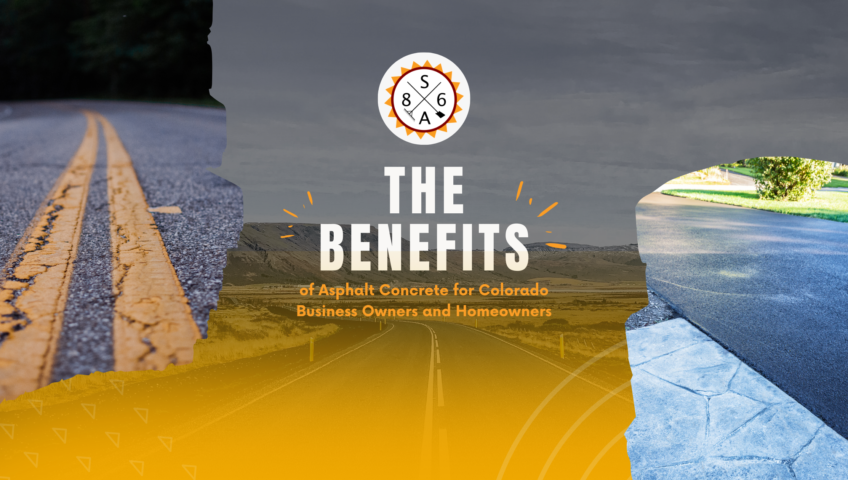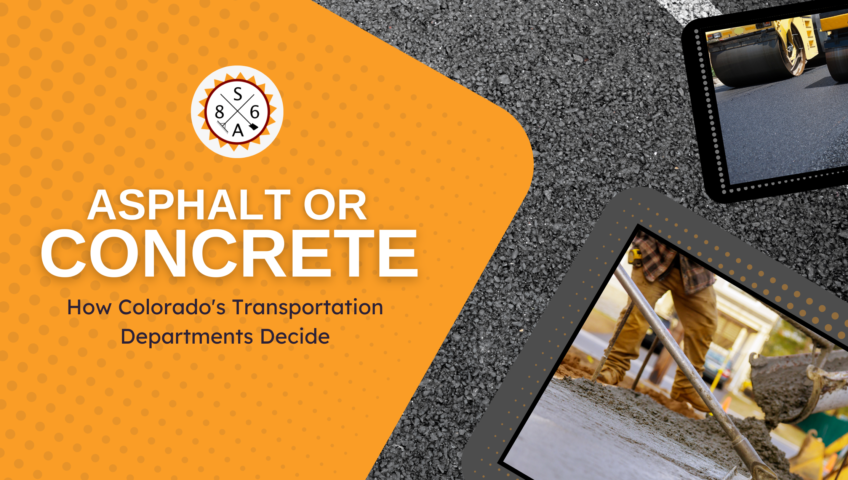
The Benefits of Asphalt Concrete for Colorado Business Owners and Homeowners
Asphalt concrete is a widely used material in road construction, known for its durability and cost-effectiveness. This material, a blend of asphalt binder and mineral aggregate, has been the backbone of Colorado’s roads, supporting the state’s transportation infrastructure. Whether you’re a business owner seeking to enhance your property’s value or a homeowner aiming for a smooth driveway, asphalt concrete offers unparalleled benefits. This article delves into the advantages, components, and applications of asphalt concrete, focusing on its relevance to Colorado’s unique climate and the needs of both businesses and residential properties.
Understanding Asphalt Concrete
What is Asphalt Concrete?
Asphalt concrete, often simply referred to as asphalt, is a composite material used primarily for paving roads, parking lots, and driveways. It consists of two main components: asphalt binder and aggregates. The asphalt binder, a sticky, black, and highly viscous liquid, acts as the glue that holds the aggregate together. The aggregates, which can include sand, gravel, and crushed stone, provide the structural framework and resistance needed for the pavement.
Types of Asphalt Concrete
There are several types of asphalt concrete, each with specific characteristics and applications:
- Hot Mix Asphalt (HMA): This is the most common type of asphalt concrete, mixed and heated at a central plant. It is durable and suitable for high-traffic areas.
- Warm Mix Asphalt (WMA): Mixed at lower temperatures, WMA uses less energy and reduces emissions. It is gaining popularity for its environmental benefits.
- Cold Mix Asphalt: Used for temporary repairs and low-traffic roads, cold mix asphalt does not require heating.
Benefits of Asphalt Concrete
Durability and Longevity
Asphalt concrete is renowned for its durability. Properly designed and constructed asphalt pavements can last for decades with minimal maintenance. This long lifespan is crucial for Colorado, where harsh winters and heavy snowfall can take a toll on road surfaces.
Cost-Effectiveness
Asphalt is a cost-effective material for road construction and maintenance. Its relatively low initial cost and ease of repair make it an attractive option for both business owners and homeowners in Colorado. Additionally, asphalt roads can be constructed quickly, reducing the impact on traffic and commerce for businesses and ensuring minimal disruption for residential areas.
Smooth and Quiet Ride
One of the standout features of asphalt concrete is the smooth and quiet ride it provides. The flexible nature of asphalt absorbs road noise, resulting in quieter highways. This is particularly beneficial for business owners who want to create a pleasant environment for customers and homeowners who value peace and tranquility in their neighborhoods.
Sustainability
Asphalt is a recyclable material. Reclaimed asphalt pavement (RAP) can be reused in new asphalt mixes, reducing the need for new materials and minimizing waste. This sustainability aspect aligns well with Colorado’s commitment to environmental conservation, appealing to eco-conscious business owners and homeowners alike.
The Role of Asphalt Concrete in Colorado
Adapting to Colorado’s Climate
Colorado’s climate poses unique challenges for road construction. The state experiences significant temperature fluctuations, with hot summers and freezing winters. These conditions can cause materials to expand and contract, leading to cracks and potholes.
Asphalt concrete, with its flexible nature, is well-suited to handle these temperature variations. It can expand and contract without breaking, making it an ideal choice for Colorado’s roads. Additionally, the use of de-icing agents and snow plows can damage road surfaces, but asphalt’s durability ensures it can withstand these stresses better than many other materials.
Supporting Economic Growth for Business Owners
A robust transportation infrastructure is vital for economic growth. Asphalt concrete plays a critical role in maintaining and expanding Colorado’s road network, facilitating the movement of goods and people. Well-maintained roads attract businesses, support tourism, and improve the quality of life for residents. For business owners, this means better accessibility and a smoother experience for customers, which can translate to higher foot traffic and increased sales.
Enhancing Residential Properties
For homeowners, asphalt concrete offers a reliable and attractive solution for driveways and walkways. Its smooth surface enhances curb appeal and provides a safe, durable path for vehicles and pedestrians. Investing in a quality asphalt driveway can increase property value and reduce long-term maintenance costs, making it a smart choice for residential improvements.
Asphalt Construction and Maintenance Practices
Design and Construction
The design and construction of asphalt pavements involve several critical steps to ensure longevity and performance:
- Site Preparation: Proper drainage and a stable base are essential for a durable asphalt pavement. This involves grading and compacting the soil to create a solid foundation.
- Mix Design: The composition of the asphalt mix is tailored to the specific needs of the project. Factors such as traffic load, climate, and intended use influence the selection of aggregates and binder.
- Paving: The asphalt mix is heated and transported to the site, where it is spread and compacted using specialized equipment. Proper compaction is crucial to eliminate air voids and ensure a smooth surface.
- Finishing: After paving, the surface is smoothed and finished to the desired texture. This can include additional compaction and the application of a seal coat to protect against weather and wear.
Maintenance and Rehabilitation
Regular maintenance is key to extending the life of asphalt pavements. Maintenance practices include:
- Crack Sealing: Sealing cracks in the pavement prevents water from penetrating and causing further damage.
- Pothole Repair: Timely repair of potholes prevents them from expanding and compromising the pavement structure.
- Overlay: Applying a new layer of asphalt over the existing pavement can restore a smooth surface and extend the pavement’s life.
- Recycling: Reclaimed asphalt pavement (RAP) can be milled and reused in new asphalt mixes, reducing waste and conserving resources.
Future Trends in Asphalt Concrete
Sustainability and Environmental Impact
The future of asphalt concrete is increasingly focused on sustainability. Researchers and engineers are exploring ways to reduce the environmental impact of asphalt production and paving. This includes the use of recycled materials, such as rubber from old tires and plastic waste, in asphalt mixes. Additionally, warm mix asphalt (WMA) technologies are being refined to further reduce energy consumption and emissions.
Smart and Connected Roads
The advent of smart technology is also influencing the future of asphalt pavements. Innovations such as sensors embedded in the pavement can monitor road conditions in real-time, providing valuable data for maintenance and traffic management. Connected roads can enhance safety, improve traffic flow, and reduce congestion.
Performance-Based Specifications
Performance-based specifications are becoming more common in asphalt paving projects. These specifications focus on the desired outcomes, such as durability and skid resistance, rather than prescribing specific materials or construction methods. This approach encourages innovation and allows contractors to use the best available technologies and practices to achieve the desired results.
The Future of Asphalt
Asphalt concrete remains a vital material for Colorado’s transportation infrastructure. Its durability, cost-effectiveness, and adaptability to the state’s climate make it an ideal choice for road construction and maintenance. For business owners, investing in asphalt paving means better accessibility, increased property value, and a smoother customer experience. Homeowners can enjoy the benefits of a long-lasting, attractive driveway that enhances curb appeal and reduces maintenance costs.
As technology advances and sustainability becomes increasingly important, the future of asphalt concrete looks promising, with innovations poised to enhance its performance and reduce its environmental impact. Colorado’s commitment to maintaining and improving its road network ensures that asphalt concrete will continue to play a crucial role in keeping the state’s roads smooth, safe, and efficient for years to come. Whether you’re a business owner looking to improve your property or a homeowner seeking a reliable driveway solution, asphalt concrete offers a proven, cost-effective, and sustainable choice for all your paving needs.
Asphalt concrete is a widely used material in road construction, known for its durability and cost-effectiveness. This material, a blend of asphalt binder and mineral aggregate, has been the backbone of Colorado’s roads, supporting the state’s transportation infrastructure. Whether you’re a business owner seeking to enhance your property’s value or a homeowner aiming for a smooth driveway, asphalt concrete offers unparalleled benefits. This article delves into the advantages, components, and applications of asphalt concrete, focusing on its relevance to Colorado’s unique climate and the needs of both businesses and residential properties.
Understanding Asphalt Concrete
What is Asphalt Concrete?
Asphalt concrete, often simply referred to as asphalt, is a composite material used primarily for paving roads, parking lots, and driveways. It consists of two main components: asphalt binder and aggregates. The asphalt binder, a sticky, black, and highly viscous liquid, acts as the glue that holds the aggregate together. The aggregates, which can include sand, gravel, and crushed stone, provide the structural framework and resistance needed for the pavement.
Types of Asphalt Concrete
There are several types of asphalt concrete, each with specific characteristics and applications:
- Hot Mix Asphalt (HMA): This is the most common type of asphalt concrete, mixed and heated at a central plant. It is durable and suitable for high-traffic areas.
- Warm Mix Asphalt (WMA): Mixed at lower temperatures, WMA uses less energy and reduces emissions. It is gaining popularity for its environmental benefits.
- Cold Mix Asphalt: Used for temporary repairs and low-traffic roads, cold mix asphalt does not require heating.
Benefits of Asphalt Concrete
Durability and Longevity
Asphalt concrete is renowned for its durability. Properly designed and constructed asphalt pavements can last for decades with minimal maintenance. This long lifespan is crucial for Colorado, where harsh winters and heavy snowfall can take a toll on road surfaces.
Cost-Effectiveness
Asphalt is a cost-effective material for road construction and maintenance. Its relatively low initial cost and ease of repair make it an attractive option for both business owners and homeowners in Colorado. Additionally, asphalt roads can be constructed quickly, reducing the impact on traffic and commerce for businesses and ensuring minimal disruption for residential areas.
Smooth and Quiet Ride
One of the standout features of asphalt concrete is the smooth and quiet ride it provides. The flexible nature of asphalt absorbs road noise, resulting in quieter highways. This is particularly beneficial for business owners who want to create a pleasant environment for customers and homeowners who value peace and tranquility in their neighborhoods.
Sustainability
Asphalt is a recyclable material. Reclaimed asphalt pavement (RAP) can be reused in new asphalt mixes, reducing the need for new materials and minimizing waste. This sustainability aspect aligns well with Colorado’s commitment to environmental conservation, appealing to eco-conscious business owners and homeowners alike.
The Role of Asphalt Concrete in Colorado
Adapting to Colorado’s Climate
Colorado’s climate poses unique challenges for road construction. The state experiences significant temperature fluctuations, with hot summers and freezing winters. These conditions can cause materials to expand and contract, leading to cracks and potholes.
Asphalt concrete, with its flexible nature, is well-suited to handle these temperature variations. It can expand and contract without breaking, making it an ideal choice for Colorado’s roads. Additionally, the use of de-icing agents and snow plows can damage road surfaces, but asphalt’s durability ensures it can withstand these stresses better than many other materials.
Supporting Economic Growth for Business Owners
A robust transportation infrastructure is vital for economic growth. Asphalt concrete plays a critical role in maintaining and expanding Colorado’s road network, facilitating the movement of goods and people. Well-maintained roads attract businesses, support tourism, and improve the quality of life for residents. For business owners, this means better accessibility and a smoother experience for customers, which can translate to higher foot traffic and increased sales.
Enhancing Residential Properties
For homeowners, asphalt concrete offers a reliable and attractive solution for driveways and walkways. Its smooth surface enhances curb appeal and provides a safe, durable path for vehicles and pedestrians. Investing in a quality asphalt driveway can increase property value and reduce long-term maintenance costs, making it a smart choice for residential improvements.
Asphalt Construction and Maintenance Practices
Design and Construction
The design and construction of asphalt pavements involve several critical steps to ensure longevity and performance:
- Site Preparation: Proper drainage and a stable base are essential for a durable asphalt pavement. This involves grading and compacting the soil to create a solid foundation.
- Mix Design: The composition of the asphalt mix is tailored to the specific needs of the project. Factors such as traffic load, climate, and intended use influence the selection of aggregates and binder.
- Paving: The asphalt mix is heated and transported to the site, where it is spread and compacted using specialized equipment. Proper compaction is crucial to eliminate air voids and ensure a smooth surface.
- Finishing: After paving, the surface is smoothed and finished to the desired texture. This can include additional compaction and the application of a seal coat to protect against weather and wear.
Maintenance and Rehabilitation
Regular maintenance is key to extending the life of asphalt pavements. Maintenance practices include:
- Crack Sealing: Sealing cracks in the pavement prevents water from penetrating and causing further damage.
- Pothole Repair: Timely repair of potholes prevents them from expanding and compromising the pavement structure.
- Overlay: Applying a new layer of asphalt over the existing pavement can restore a smooth surface and extend the pavement’s life.
- Recycling: Reclaimed asphalt pavement (RAP) can be milled and reused in new asphalt mixes, reducing waste and conserving resources.
Future Trends in Asphalt Concrete
Sustainability and Environmental Impact
The future of asphalt concrete is increasingly focused on sustainability. Researchers and engineers are exploring ways to reduce the environmental impact of asphalt production and paving. This includes the use of recycled materials, such as rubber from old tires and plastic waste, in asphalt mixes. Additionally, warm mix asphalt (WMA) technologies are being refined to further reduce energy consumption and emissions.
Smart and Connected Roads
The advent of smart technology is also influencing the future of asphalt pavements. Innovations such as sensors embedded in the pavement can monitor road conditions in real-time, providing valuable data for maintenance and traffic management. Connected roads can enhance safety, improve traffic flow, and reduce congestion.
Performance-Based Specifications
Performance-based specifications are becoming more common in asphalt paving projects. These specifications focus on the desired outcomes, such as durability and skid resistance, rather than prescribing specific materials or construction methods. This approach encourages innovation and allows contractors to use the best available technologies and practices to achieve the desired results.
The Future of Asphalt
Asphalt concrete remains a vital material for Colorado’s transportation infrastructure. Its durability, cost-effectiveness, and adaptability to the state’s climate make it an ideal choice for road construction and maintenance. For business owners, investing in asphalt paving means better accessibility, increased property value, and a smoother customer experience. Homeowners can enjoy the benefits of a long-lasting, attractive driveway that enhances curb appeal and reduces maintenance costs.
As technology advances and sustainability becomes increasingly important, the future of asphalt concrete looks promising, with innovations poised to enhance its performance and reduce its environmental impact. Colorado’s commitment to maintaining and improving its road network ensures that asphalt concrete will continue to play a crucial role in keeping the state’s roads smooth, safe, and efficient for years to come. Whether you’re a business owner looking to improve your property or a homeowner seeking a reliable driveway solution, asphalt concrete offers a proven, cost-effective, and sustainable choice for all your paving needs.




